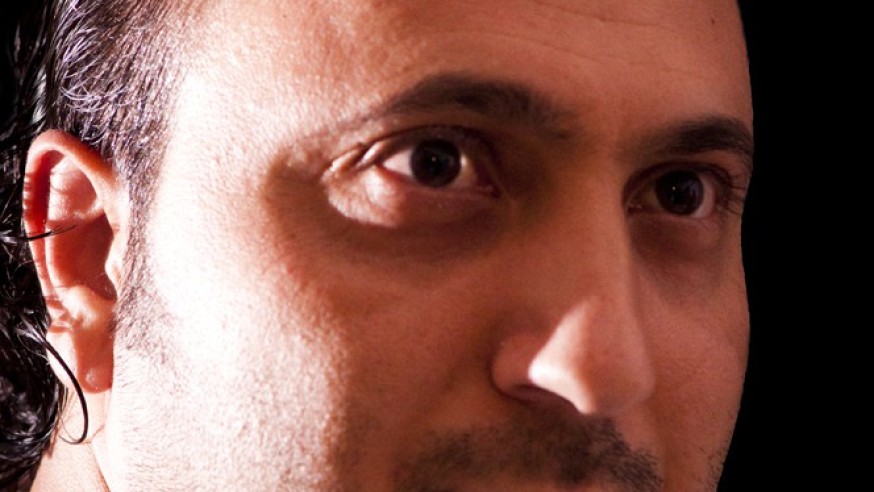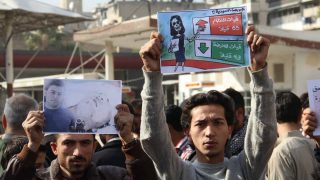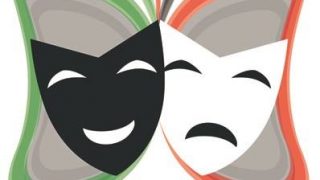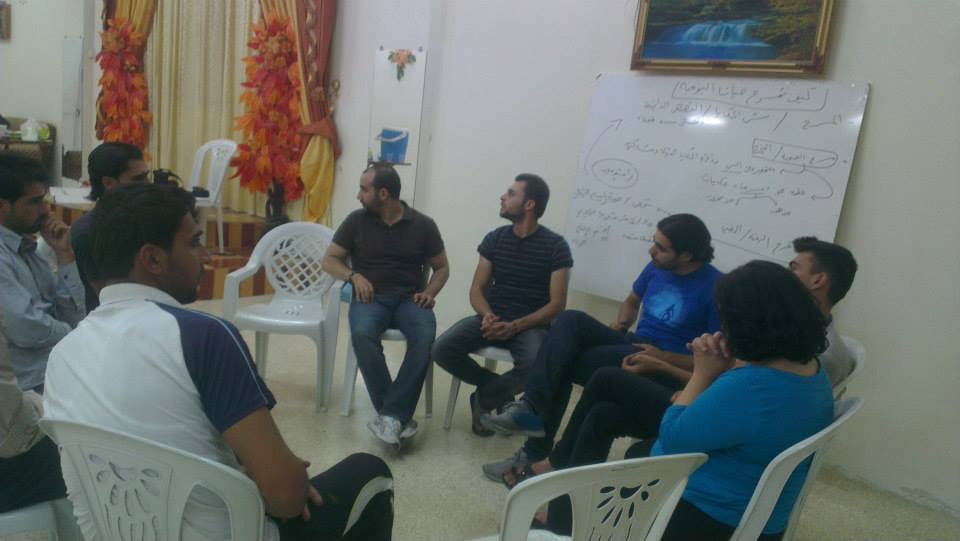Researcher, director and drama teacher Ziad Adwan had no idea that fate was rearranging his life when one of his friends in London, where he was finishing his doctorate, jokingly asked him: “What do you think of moving to Berlin?”
This incident happened before the outbreak of the Syrian revolution which impacted all Syrians, including Ziad who was in Syria at the time.
He returned to Damascus in 2009 after 10 years studying in London, where he completed a PHD in Theatre Studies at Royal Holloway, University of London. In the Syrian capital, he taught at the Higher Institute of Dramatic Arts while also working as a director and acting in several plays and films.
Ziad was surprised to see the rampant corruption, theatrical destitution and fierce gossip prevalent in the artistic and cultural circles of Syria. Television dominated the cultural scene to the extent that whenever somebody said, “I have a production”, there was no doubt they meant a television production. Otherwise, it was not taken seriously. People were not interested in other forms of artistic production—whether literary or cinematic.

Ziad did not mean all television productions were bad. He praised productions like “Lost Village” (Deaa Dayea) and some works directed by Hatem Ali. But, the problem with this dichotomy that surfaces sometimes is that “the same actor who excels in a television series can instead appear confused on [the theatre] stage.” All these elements in addition to others made this ambitious artist feel limited in his country.
With the deteriorating situation in Syria, Ziad in 2013 decided to leave to the United Arab Emirates (UAE). There he supervised script-writing and acting in the cinema department of the twofour54 media and entertainment hub in Abu Dhabi. When his contract ended, just like all Syrians who had been scattered around the world due to the plight of their country, he could not stop wondering, “Where to now?”
Germany’s doors were open to Syrians, and several of Ziad’s friends were already in Berlin, where he was able to ruenite with his London mates. And so, he went to Berlin indeed. What started as a joke or suggestion made in passing had become reality.
Berlin, a city looking to the future
“Berlin was the city most welcoming for cultural and international projects, and it was cheap and livable,” Ziad told SyriaUntold.
“I did not know Berlin although I had worked in other German cities. But, as soon as I set foot in it, I knew it was my city, especially when I saw Alte Schönhauser Allee street. I wanted to live in this narrow street with charming architecture, blending modernity and tradition. Berlin, in short, is a city mixing history with authenticity. Due to the war, it appears open to everything new, after having lost a lot. It is a city aspiring to the future, despite the war,” he said.
Moreover, the ubiquitous presence of English in Berlin coupled with the local population’s tolerant outlook helped Ziad. He continued to teach English along with his theatrical work
Numerous projects and inexhaustible energy
Ziad’s work and time are divided between different projects. For a while, he was collaborating with his wife Mey Saifan, choreographer and contemporary dance instructor, on the Syrian Dreams Project.
He is also working on the play “Please, Repeat After Me”, which tackles theatrical errors and constitutes his PHD thesis topic. Ziad decided to evoke theatrical errors through Syrian refugees and their testimonies, which he reflected on stage. He focused on the mistakes and tried to answer certain questions. When a mistake happens on stage, the actor freezes and goes back to his real personality. But, what happens when an error is committed while the refugee is speaking about his real-life experience on stage? To what extent can we focus on the actor being a refugee in reality and living the role on stage to overlook their amateur performance or errors?
The Syrian Dreams Project began with the protests in Syria. A Facebook page was created asking different categories of Syrians, activists and key players to write down their dreams. These were later read and archived to constitute the primary theme of cinematic, theatrical and artistic works.
Through physical theater (ballet and contemporary dance), the couple presented the trilogy “Destruction for Beginners” (Al-Takhrib lil Mubtadieen”), which is a series of physical theater plays whose characters, events and settings are inspired by archived dreams. So far, three parts have been produced.
Love as a creative partnership
Ziad spoke about Mey being not only his personal life partner, but also his theatrical partner.
“On the personal level, Mey and I always pose questions about how each of us benefits from the other’s mind and how far we get along and appreciate developing each other’s ideas,” Ziad said.
“Mey began showing the Syrian Dreams Project in 2011, and we created a Facebook page to ask people what dreams they had the night before, with the onset of the protests,” he added.
“In 2010, May took interest in the world of dreams. Practically, activity in dreams is distinct from that on stage, and May is working on this. She adds her dance terms to the production, and even in the presence of actors, May communicates to them her dance ideas. Meanwhile, I address performance and dramaturgy, and the production is then complete. May and I work as a team, and try to produce a comprehensive act that is not limited to a certain vision,” Ziad explained.
Theater naps
The most recent performance that Mey and Ziad worked on was entitled “Siesta” (Qayloula), which is also derived from the world of dreams. The set included 12 tents, each of which contains tangible elements of dreams. In one of the tents, there were seashells, and each seashell carried sounds, ranging from rescue calls and voices of the dead in the sea to drowning people’s screams, calls to the coast guard and some refugees’ dreams on their journeys and in their lives abroad.
One of the tents was closed and inaccessible. However, it had holes allowing the audience to see photo fragments reflecting the war and destruction in Syria. The images could not be viewed as a whole.
The play featured actors, of course, walking around and performing their shows between the tents and among the crowds. This was a theatrical show with a full-blown set.
Theater as a form of catharsis
Theater is not only for fun and shows, but also a form of treatment, he believes. How so? We ask.
Ziad is betting on this with conviction. He works with refugees from all over the world, not just from Syria, to help them adapt to their new environment. In 2016, Ziad produced an interactive play in Munich, pieced together from the stories of refugees from Nigeria.
“Every refugee thinks his tragedy is the worst. But, I noticed that Syrian refugees are the most shocked, as Syria was safe before 2011,” he said. “Syrians before this date never thought of asylum or migration. Suddenly, they found themselves walking into the unknown, without having any previous idea about it.”
Ziad noted: “This was a shock in itself. But, the situation in Syria before 2011 was also catastrophic.
The stage and key questions tackled on it
Corruption, identity, the changing forms of terrorism, violence and how to respond to it, tyranny, protests, war, asylum… These are all notions and questions underlying Ziad’s work and occupying his mind. Popular prejudices casts Arabs, including Syrians, as rich tourists in the 1990s. After 2001, they became terrorists, and now they are refugees. This gives us space to contemplate the human within us, and to think about the world and the lives of others.
All these question, he says, push us to think and work.
“How come the Islamic State (IS) suddenly emerged and disappeared in the same way?” Ziad asks.
“IS destroyed what Bashar Assad’s hand had spared. They took the place I had dreamt one day would be mine. Before the revolution, I thought of staying in Syria. I travelled a lot, but returned often. They killed this dream. Syria triggered questions I never knew would materialize. For example, how can a dream or metaphor become reality? When we think of slogans like “Assad stays or the country burns,” “Crawling to Europe,” or “We have come to slay you,” we realize they were metaphors that have become reality,” Ziad argued.
Ziad remains immersed in theater and life, in terms of script, writing and direction. Still, he did not give up on his academic work. He is writing theatrical research about theatrical architecture in Syria and the UAE in which he discusses the stage setting and location in the city, the architectural nature as well as the relationship between theater and the authorities. In Syria, no theaters were built in Hafez Assad’s days, and only some were inaugurated under Bashar’s rule.
Dictatorships have always sought to contain theater when they realized it is a space to practice democracy, and we can see that from its architecture and venue. Dictatorships tried to empty theater of its content. The Opera House in Syria summarizes the story of Syrian theater with the authorities. Hafez ordered building the opera but did not see it through to the end. He did not have a vision to institutionalize it within a totalitarian system, as Ziad argues in one of his academic articles.
His son, Bashar, completed the establishment but to this day, we find a direct relationship between the Opera House and the presidential palace. Cafés in theaters were also neglected deliberately because they were a place to meet and discuss. The end point is that authorities are destroying the theater because it is the beginning and essence of dialogue. After all, isn’t theater an ongoing dialogue?
Ziad is trying to find the perfect space for this dialogue—a free space allowing life, work and creativity away from “the land of oppression and frustration,” in the words of Syrian poet Nizar Qabbani.







